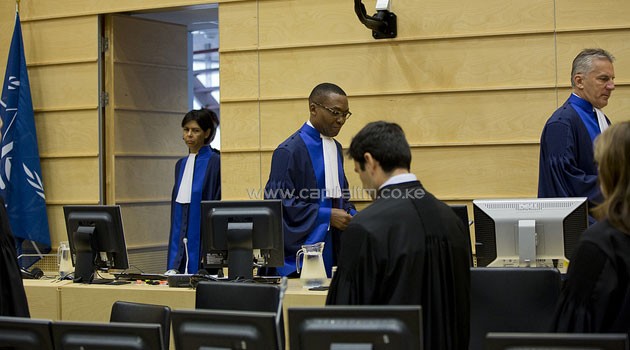
Trial Chamber V(a) Presiding Judge Chile Eboe Osuji said they would admit it as the Prosecution made it clear that they were only planning to rely on it for background information/FILE
Ali – whose charges were dropped at the ICC – submitted the documentary evidence before the Philip Waki-led Commission of Inquiry into Post-Election Violence (CIPEV).
Trial Chamber V(a) Presiding Judge Chile Eboe Osuji said they would admit it as the Prosecution made it clear that they were only planning to rely on it for background information.
“Such background information is what the police said they were doing and what they said they had observed. We are alive of course to the difficulty with incriminating material being dragged in through this document,” Osuji said.
But he assured the defence, who were opposed to its admittance, that they would have ample opportunity to object should the prosecution go back on its word.
“The defence will make submissions at the end of the day if the prosecution does try to exceed the purpose for which they had said they had sought to tender the document,” he said.
Ruto’s defence counsel David Hooper had sought to have the chamber disallow the documentary evidence on the grounds that it was testimonial in nature and that as Ali had been charged by the Office of the Prosecutor, it did not pass the objectivity test.
“There might be an interest straight away of providing perhaps a self-serving statement and immediately one’s therefore in a position to reflect that this particular statement may have less probative value for that reason alone,” he argued.
Hooper instead suggested that it might be better if the prosecution called Ali to the stand where he could undergo cross-examination.
“How can the prosecution justify if it wants to rely on this kind of thing? Producing this kind of document and not calling the witness? They want the witness General Ali, he’s available, they know that.So this is back door witnessing,” he argued.
The prosecution however maintained that they would rely on the documentary evidence purely for its probative value and not to directly link the defendants to the 2008 PEV for which they stand trial.
“The Kenya Police report is a compilation of different data that the police collected from the District Commissioners in the field in the different areas affected by the violence. It contains as well information that the Police distributed to the media with accuracy about the incidents that were reported,” Trial Lawyer Alice Zago argued.
As the report Ali submitted to the CIPEV had not been signed, the prosecution called to the stand a court clerk who authenticated it and who the defence said it would like to cross-examine on Tuesday.














































